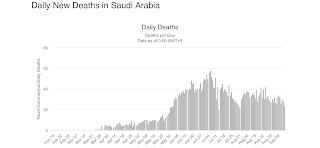This week saw the daily number of cases stay steady in the 200s. Schools started so we will see if next week that will lead to a second wave. Many countries in the world, especially in Europe, are dealing with a huge increase in cases but so far in Qatar that hasn't happened yet. I spoke to someone that I know in the public medical field here and they told me most of the cases appeared to be Qataris and white-collar expats, with a lot of spread amongst families. They don't see as many blue-collar expat cases as before. This means an increased likelihood of the virus spreading in schools, most blue-collars workers do not have their families here so daily cases are more likely to reach children.
Is there any reason to trust the data from the Government? I think so. Remember Qatar has the highest per capita number of detected cases in the world, currently at 4.3% of the population. The next highest rate is Bahrain at 3.4% (UK is at 0.5%, US at 1.9%, Canada at 0.35%). If Qatar was fudging numbers to "look good" they wouldn't be reporting such a large number of cases, Qatar could have reported a quarter of the cases and people would have believed it.
Nowadays for COVID-19 stats I go to worldometers.info, which updates information as they receive it. You can report information as long as you cite a source -- in the last few months I sent them updates based on Government presentations and the website was updated within 15 minutes. They also have charts/graphs for every country and examining them shows interesting trends.
Qatar has a solid bell curve when the first wave hit in May-June, which then tapers off to where we are today, roughly 200-300 cases a day.
The deaths follow a similar pattern, with a 2-4 week delay from the peak.
But when you look at Saudi Arabia, you see a similar bell curve for cases:
But not for deaths, which have barely reduced:
That the death rates have not significantly decreased is odd given the dramatic drop in daily cases. It indicates a problem with the data, either Saudi is not detecting cases well anymore or they might be counting deaths as COVID-19 related when perhaps they are not.
Bahrain has entered a second wave -- daily cases are now worse than ever (and on a per-capita basis nearly seven times worse than Qatar):
And the deaths are starting to pick up as well. Sadly the country passed Qatar in total deaths this week, despite having roughly half the population.
Kuwait never appeared to get a handle on things, daily cases have been steady since mid-May:
I am guessing Kuwait wasn't detecting many of the COVID-19 cases back in May-June as the death rate then was much higher than it is now, despite the detected number of cases not decreasing significantly. Per capita case rate is also more than double Qatar's right now so it's hard to say if Kuwait is in the beginning of a second wave since the first wave never seemed to taper off.
Finally Oman. I don't know what happened here, it appears in August they stopped publishing frequent case data because the information suddenly becomes sparse:
Is it a second wave? It's hard to say, the big spikes occur after a gap in data, it's possible that Oman is reporting all of the deaths over the period, so you have data for 3-5 days in one go.
So Qatar's data seems to follow an expected cases to deaths pattern, whereas with some of the other nearby countries it can be a bit more problematic. I don't see any reason to mistrust the Qatar data at this time.









